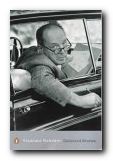a critical examination of Nabokov’s collected stories
 Andrew Field describes ‘The Reunion’ (1932) as a ‘Chekhovian study in noncommunication’ (LA,p.116) and it is certainly another study in failure – a meeting at which nothing of any significance takes place. But this failure is itself significant – in what it tells us of the two people who meet. The protagonist of the story is Lev, another in the long line of Nabokov’s Gogolian litterateurs. An émigré living in Berlin, he has completed his interrupted university studies in Prague and now lives in abject poverty, writing occasional articles for newspapers. He is just about to celebrate the Russian Christmas with a few friends when he learns that his brother (who has stayed in the USSR) is going to visit him that evening.
Andrew Field describes ‘The Reunion’ (1932) as a ‘Chekhovian study in noncommunication’ (LA,p.116) and it is certainly another study in failure – a meeting at which nothing of any significance takes place. But this failure is itself significant – in what it tells us of the two people who meet. The protagonist of the story is Lev, another in the long line of Nabokov’s Gogolian litterateurs. An émigré living in Berlin, he has completed his interrupted university studies in Prague and now lives in abject poverty, writing occasional articles for newspapers. He is just about to celebrate the Russian Christmas with a few friends when he learns that his brother (who has stayed in the USSR) is going to visit him that evening.
Worried by the potential embarrassment, he cancels the celebration and wonders what he can possibly talk about with someone he has not seen for ten years. The brother Serafim arrives and Lev’s worst fears are justified. They exchange painfully dull small-talk, fail to make the slightest connection with each other, and Serafim leaves after a short while, leaving Lev to wonder if he can still celebrate with his friends.
Once again, closure to the story is not offered by any dramatic outcome to the meeting, which is an embarrassing non-event for the two participants. Instead, we are presented with the more delicate and subtle epiphany which Lev experiences, emphasising his more sensitive consciousness and his sense of cultural continuity. By this device the reader is also offered two contrasting views of Russian character under the pressure of twentieth century events.
The significance of this failed ‘reunion’ lies in what we are invited to see as a contrast between the two brothers who stand for two different responses to the Russian revolution. Lev has become an émigré, but he has preserved his links with Russian culture, studying ‘Slavophile influences on Russian literature’ (DS,p.128) and keeping its traditional festivals. Towards the end of the meeting they are both trying to recall the name of a dog which featured in their childhood: Serafim gives up, but Lev pursues the issue and eventually remembers the name. He is keeping the memory of pre-revolutionary Russia alive in this small act of reverence for the past.
Serafim is completely unlike him: large and overweight where Lev is thin; insensitive and boorish where Lev is considerate to others; and almost aggressively philistine: ‘I don’t do much reading … Never have enough time’ (p.133). Despite this statement he goes on to give Lev a tedious precis of a trashy novel he has picked up on a train, and he then delivers a lecture on magnetic fields. Serafim is a product of the new Soviet Russia as Nabokov perceived it – unimaginative, vulgar, and time-serving. In one of Serafim’s speeches Nabokov catches the empty jargon of the apparatchik:
‘inasmuch as the fundamental prerequisite of industrialisation … is the consolidation of socialist elements in our economic system generally, radical progress in the village emerges as one of the particularly essential and immediate current tasks’ (p.128)
Serafim is a rare instance of a Soviet Russian straying into Nabokov’s work, but the inferences to be drawn from this character sketch are unmistakable.
In terms of narrative mode there is further evidence of the experiments Nabokov was making to develop what was to become the hallmark of his literary style – a conversational, self-conscious narrative voice which draws attention both to itself and to the realm of fiction in which it operates. The opening of ‘The Reunion’ illustrates well his ability to shift subtly from third person omniscient mode, into interior monologue, back out again, and then cheekily pop up to speak directly to the reader in the first person, drawing attention to his own fiction:
‘Lev had a brother, Serafim, who was older and fatter than he, although it was entirely possible that during the past nine years – no, wait … God, it was ten, more than ten – he had got thinner, who knows. In a few minutes we shall find out’ (p.127)
This ‘we’ might be Lev thinking of his brother’s impending arrival, but there is more than a hint of Nabokov-as-narrator peering over his shoulder. This foregrounding of the narrator is pushed a stage further in the stories which followed.
© Roy Johnson 2005
![]() Vladimir Nabokov: The Collected Stories – Amazon UK
Vladimir Nabokov: The Collected Stories – Amazon UK
![]() Vladimir Nabokov: The Collected Stories – Amazon US
Vladimir Nabokov: The Collected Stories – Amazon US
Vladimir Nabokov web links
Vladimir Nabokov greatest works
Vladimir Nabokov criticism
Vladimir Nabokov life and works